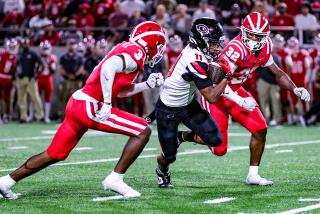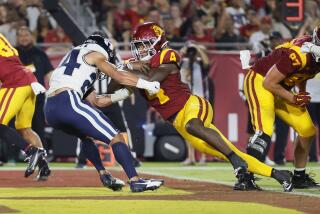City Slicker : Bradford Banta Gave Up His Southern Lifestyle and a Chance at LSU Football to Come to Los Angeles and Play for the Trojans
The odds were long that Bradford Banta would wind up at USC.
It wasn’t only that Banta had been born in Baton Rouge, La., and raised in Baton Rouge and in Jennings, La., a farming community of about 11,000 that is in the Louisiana bayou country about 150 miles west of New Orleans.
It wasn’t that Banta couldn’t get enough of his mother’s crawfish etouffee or the open spaces of his grandfather’s 400 acres, where he loved to hunt ducks, geese and rabbits and fish for largemouth bass and perch.
It wasn’t that Banta, one of the country’s most highly recruited tight ends during the high school football season of 1988, was hotly pursued by Louisiana State, the alma mater of his parents and several other relatives.
What made his move to USC so improbable was that Banta was the best prospect on an unbeaten state small-schools champion football team at University Laboratory High--which happens to sit on the LSU campus in Baton Rouge.
University plays its home football games on LSU’s practice field, in the shadow of Tiger Stadium. Banta said that about 80% of his graduating class of 64 enrolled at LSU, among them teammate Chad Loup, a backup quarterback for the Tigers.
So, when former USC assistant Bobby April suggested to Trojan Coach Larry Smith that USC might have a shot at Banta, Smith suggested that April’s recruiting efforts probably would be better spent elsewhere.
“I kept telling Bobby April he was crazy,” Smith said.
In the end, though, Smith was more concerned about losing the 6-foot-6, 245-pound redhead to UCLA than LSU.
“After I talked to the parents, I was pretty convinced that he wasn’t going to LSU,” Smith said. “His parents were all for him going out and expanding his roots.”
So was Banta.
“I just wanted to experience something different, and so far I have,” he said. “It has been a great experience for me.”
Before his senior year at University, Banta made unofficial trips to USC and UCLA. Later, he made official trips to both schools, as well as to Georgia and, yes, LSU.
“He felt a closeness at USC,” said his father, Dennis, a businessman who, along with his wife, Jean, supported the choice and sent their only son off to Los Angeles.
Banta came out a few months early--”I didn’t want to come out here a total greenhorn,” he said--but still suffered culture shock.
“The thing that’s hard to get used to is that each town is separated by a sign, and there’s no green in between,” he said. “That’s the thing that amazes me. There are just so many people out here.”
Nicknamed “Ragin’ Cajun” by teammate Joel Crisman soon after he enrolled at USC, Banta is the biggest and best blocker among the Trojans’ tight ends, a distinction that helped him earn a starting position this season over last year’s starter, Yonnie Jackson.
“He takes a lot of pride in what he does,” Smith said. “He’s an excellent blocker, and he has worked hard to become a better pass receiver.
“The problem I feel badly about is, we can’t get the ball to him enough. The reason is, with all the eight-man (defensive) fronts, you just about have to keep him in (to block), and if he does get out (in a pass pattern), he gets out late.”
Banta said only 10 passes have been thrown to him this season. One was thrown behind him, one he dropped and eight he has caught for 114 yards and a touchdown.
After dropping a pass near the goal line during a season-opening tie against San Diego State, Banta has dedicated himself to staying after practice each day to catch at least 20 passes.
“I was very disgusted with myself,” he said. “I knew I was better than that; I just had to prove it.”
As anonymous as a blocking tight end might be, Banta is even less known as USC’s long snapper on punts and kicks, which is how he likes it.
“When people ask me if I snap, I say, ‘Yeah, but you don’t want to hear my name,’ ” he said, realizing that he will only gain widespread notice for his underrated skill if he makes a mistake.
As for the anonymity of a tight end who catches one pass a game, Banta is not concerned.
“You just think of it as your job,” he said. “You have to do it. If somebody notices you, great, but you have to take it upon yourself to get the position noticed.”
More to Read
Go beyond the scoreboard
Get the latest on L.A.'s teams in the daily Sports Report newsletter.
You may occasionally receive promotional content from the Los Angeles Times.






